Al Jazeera.....
Court rules Sao Paulo subway strike 'illegal' |
Workers must pay increased daily fine if they continue action as strike threatens opening game of Brazil World Cup.
Last updated: 08 Jun 2014 20:21
|
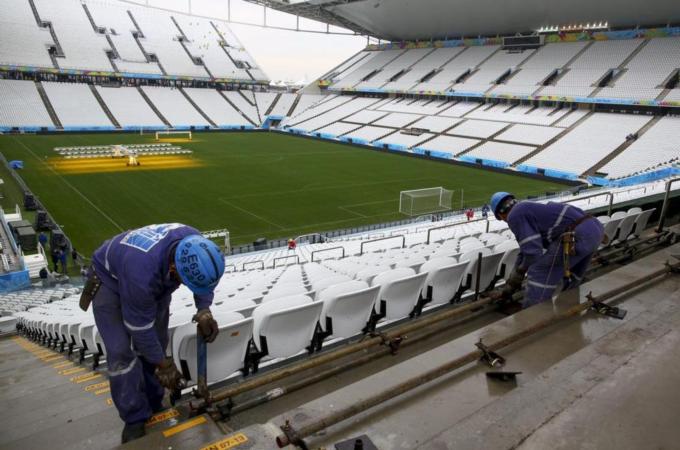
Corinthians Arena, the venue of the World Cup kick-off game, has itself been plagued by delays [EPA]
|
| A Brazilian court has ruled that a subway strike that has caused traffic mayhem in Sao Paulo, raising fears of transport chaos at this week's World Cup kick-off, is illegal. The judges ordered the subway worker's union on Sunday to pay a $222,000 fine for every day that the strike continues, up from the $45,000 they had to pay for the strike's first four days. The union said it voted in favour of continuing the strike that was called "abusive" by the court. "Clearly, the court ruling was a big blow to the unions," said Al Jazeera's Gabriel Elizondo, reporting from Sao Paulo. "FIFA and the Brazilian government are watching this very closely as the majority of the tourists and football fans in Sao Paulo will be using the metro or train to go to the opening match this Thursday." The five-line subway system has been partially operating, but trains were not arriving at the Corinthians Arena that will host the opening game. Worker demands Union workers have reduced an initial demand for a 16.5-percent wage hike to 12.2 percent, but employers are offering 8.7 percent. The subway standoff led to a clash on Friday between picketing strikers and police inside a metro station, with authorities swinging truncheons and firing tear gas to disperse the protesters. Authorities are desperate to resolve the latest labour dispute to avoid another embarrassing incident in a World Cup hit by delays, cost overruns and protests, even before it has started. The 61,600-capacity Corinthians Arena has itself been plagued by delays, and construction workers were racing against the clock over the weekend to finish it before the opening whistle. |
Miami Herald.....
Brazil subway strike on in WCup city despite fine

Metro trains sit parked on the second day of a strike by the operators in Sao Paulo, Brazil, Friday, June 6, 2014. Overland commuter train operators went on strike Thursday, stranding the millions of people who use Sao Paulo's public transport systems.
BY ADRIANA GOMEZ LICON
ASSOCIATED PRESS
SAO PAULO -- A labor court slapped fines on the subway workers union Sunday for a strike that has closed many stations and clogged the avenues of Brazil's largest city just days before it hosts the World Cup opening match.
Angered by the ruling, union representatives said the strike would continue Monday, and its leader warned that the strikers would try to shut down the subway line serving the stadium hosting the tournament's first game Thursday.
Union officials also said other groups promised to join strikers early Monday for a big demonstration at a metro station.
"The government is declaring a war against its workers," said Alex Fernandes, the union's general secretary. "They sit down to talk to us or there won't be subway service during the World Cup."
Subway workers were angry that the eight-judge panel threatened even higher penalties if they didn't return to their jobs. The court fined the union $175,000 for the first four days of the strike and said it would add on $220,000 for each additional day the work stoppage continued.
Authorities have been able to provide limited subway service, but the strike has resulted in traffic chaos clogging key streets and has closed the main subway stations in Sao Paulo. If the walkout continued Thursday, it would be difficult if not impossible for many fans to get to Itaquerao stadium for the opening match featuring Brazil and Croatia. The stadium is about 12 miles (20 kilometers) east of the city center.
Sunday was the fourth day of the strike, and it closed more than 30 subway stops. World Cup visitors arriving in the city have run into more traffic jams than usual in a city already used to heavy congestion.
"There was no minimum care for the population, causing great disturbance, even in terms of public safety," said judge Rafael Pugliese, who was on the panel that imposed the fine.
The Regional Labor Court in Sao Paulo also agreed with management's offer of an 8.7 percent wage increase for subway workers.
The strikers are demanding an increase of more than 12 percent, but the Sao Paulo state-owned company that runs the system says that isn't possible because fares haven't gone up the past two years.
Union leader Fernandes said it won't pay the fines and will appeal the judges' ruling.
The court met over the weekend because of concerns about the strike's effect on the World Cup, which Brazil's leaders had hoped would be a chance for Latin America's biggest and richest country to shine on the international stage.
Police officers, teachers and public transportation workers have staged strikes in the weeks leading up to soccer's premier event. These have overshadowed protests over the cost of putting on the World Cup, which had been feared for possible disruptions following last year's huge anti-government demonstrations during the Confederations Cup soccer tournament.
Adriana Gomez Licon on Twitter: http://twitter.com/agomezlicon
From Yahoo.....
Brazil's World Cup security clampdown
Rio de Janeiro (AFP) - Brazil is to deploy a 170,000-strong security force for the World Cup to deter hooligans from home and abroad.
Mass protests against the tournament and deadly fan violence have put authorities on alert ahead of the start of the tournament on June 12.
The threat of hardline fans from across the border in Argentina or flying in from England and other European nations has accentuated the sense of urgency.
Prresident Dilma Rousseff this week ordered the army to reinforce police guarding the hotels and training camps for the 32 countries taking part, the defence ministry said.
Thirty infantry troops were sent Wednesday to Brazil's base camp in Teresopolis, outside Rio de Janeiro. Brazil play the opening match against Croatia on June 12.
Some 1,800 private security guards have been assigned to each of the 12 World Cup stadiums. About 700 federal agents will also be drafted in if needed, officials said.
Organizers are also deploying banks of cameras, X-ray machines and metal detectors to keep potentially dangerous items out of stadiums.
They have already banned the "caixirola," a trumpet-like instrument the government had promoted as Brazil's answer to the vuvuzela, the horn that created a noisy stir at the 2010 World Cup in South Africa.
Some fans threw caixirola onto the pitch during test games last year. Authorities decided it was too risky and banned the trumpet as a potential weapon.
- Closed borders -
The security clampdown starts at Brazil's borders. The government has held intelligence exchanges with Argentina, England and other countries over known hooligans.
"We have struck agreements through FIFA. The objective is to stop them (violent fans) from getting here and then, if they do, to keep them from entering the stadiums," said President Dilma Rousseff.
Tens of thousands of Argentine fans are expected to cross the border to support their two-time champions.
Hardcore Argentine fans, known as "barras bravas", were involved in incidents at the 1986 World Cup in Mexico, in France in 1998 and in South Africa four years ago. A number were expelled.
The Argentinian government has provided a list of known trouble-makers. But Brazilian authorities acknowledge that they cannot keep all troublemakers away from the tournament.
At last year's Confederations Cup, a World Cup rehearsal, stadium problems were minor. But mass protests in the streets turned violent and took the government by surprise.
Police had to disperse more than a million people protesting against the multi-billion dollar cost of the World Cup and the 2016 Rio Olympics. There is widespread anger over the state of Brazil's infrastructure and public services.
Violence has also hit Brazil's domestic football league.
A toilet bowl hurled by one hooligan in the World Cup city of Recife four weeks ago killed one person. In February, one fan died after being savagely beaten in Sao Paulo.
Last year, there were clashes between supporters in the southern city of Joinville. And Corinthians fans invaded the Sao Paulo club's training base in February and attacked players.
Security trials have been held at the 12 venues in recent months using domestic matches or continental tournaments such as the Copa Libertadores.
"We have not registered any serious incidents (at test events) since the Confederations Cup," Hilario Medeiros, head of security for the World Cup organizing committee, told AFP.
But the World Cup will feature 32 teams and not just eight as last year, when Brazil's fierce rivals Argentina did not compete.
Brazilian authorities say they are leaving nothing to chance however.
Stewards will be first to intervene in a stadium if tensions mount.
"If that doesn't sort it out then the police will step in and if necessary forces and tactical groups will provide wider response," Andrei Rodrigues, justice ministry secretary for major events, told AFP.
Police will patrol around all stadiums.
At FIFA's behest, fans will be kept away from training sessions. But after protests were made, Brazil are pondering allowing special access to 10 to 15 fans at a time.
Subway staff extend strike snarling World Cup city
Sao Paulo (AFP) - Sao Paulo subway workers ignored a court ruling Sunday and extended a strike threatening to cause traffic mayhem at the World Cup's opening game in Brazil's biggest city.
The subway staff's union voted to press on with the strike hours after a labor court ruled it was illegal and imposed a $222,000 fine for every day they fail to work.
The strike has already caused massive traffic jams in the business hub of 20 million people as the city's new stadium prepares to welcome more than 60,000 fans for Thursday's Brazil-Croatia game.
The ruling came as more teams arrived in Brazil, with Germany greeted by several hundred people at its northeastern base and England landing in the picturesque city of Rio de Janeiro.
Eighteen of the 32 teams are now on the ground, but the chaos gripping Sao Paulo -- the latest in a wave of strikes and protests ahead of the tournament -- has distracted the usually passionate footballing nation from the World Cup buildup.
Union president Altino Melo dos Prazeres told subway workers they should seize on the tournament and elections later this year to pressure authorities.
"There's a World Cup, the biggest sporting event in the world. The state government has elections at the end of the year. It has to negotiate," he said before the union voted to maintain the strike, according to the G1 news website.
The 9,000-member union said it would hold a protest on Monday morning at a metro station where police used tear gas and truncheons to disperse strikers last Thursday.
The demonstration with the Homeless Workers' Movement (MTST) and other groups promises to add more traffic headaches in a mega-city already congested by the subway disruption.
The protest over wage demands is the latest social upheaval to hit Brazil, where there have been angry demonstrations against the World Cup's $11 billion bill.
The five-line subway system has been partially operating, but trains were not arriving at Corinthians Arena, which will host the opening game.
Union workers have reduced an initial demand for a 16.5 percent wage hike to 12.2 percent, but employers are offering only 8.7 percent.
- Unfinished stadium -
Authorities are hard-pressed to resolve the latest labor dispute to avoid another embarrassing incident in a World Cup hit by delays, cost overruns and protests even before it has started.
The 61,600-capacity Corinthians Arena has itself been plagued by delays, and construction workers were racing against the clock over the weekend to finish it before the opening whistle.
Workers were wiping seats, checking beams and installing wiring in two temporary stands for 20,000 fans late Saturday. VIP room sofas and fridges for food stands were still wrapped in plastic.
"There's still much to do," said one construction worker, who spoke on condition of anonymity because he was not authorized to speak to the media.
Another wiped sweat from his forehead as he said: "It will be ready before the World Cup."
- President promises party -
In another dent on the preparations, FIFA announced that US pop star Jennifer Lopez had pulled out of the opening ceremony at the arena due to "production issues."
Lopez recorded official World Cup song "We Are One" with rapper Pitbull and Brazilian singer Claudia Leitte.
Delays at five of the 12 host stadiums have contributed to the rising bill of hosting the tournament, infuriating many Brazilians who have held protests demanding President Dilma Rousseff spend the money on hospitals and education instead.
Rousseff insists the money spent on the tournament will leave a legacy of modernized airports and transport infrastructure that will benefit Brazil for years to come.
But much of the promised train and road infrastructure has been shelved.
Last year's Confederations Cup, a World Cup dress rehearsal, saw more than a million people take to the streets, but this year's demonstrations have been smaller.
Rousseff, who is seeking re-election in October polls, defended the tournament again as she inaugurated a traffic control center in the southeastern state of Minas Gerais.
"I am certain the World Cup will be a celebration," she said. "It is fundamental that people, the majority of whom are Brazilians, also have the right to enjoy this great party."
http://www.tomdispatch.com/post/175853/tomgram%3A_eduardo_galeano,_the_world_cup_and_the_corporatization_of_soccer/
Tomgram: Eduardo Galeano, The World Cup and the Corporatization of Soccer
[Note for TomDispatch Readers: There is a tiny universe of editors of Eduardo Galeano. I was once one of them. Carl Bromley of Nation Books is so today. For an editor, working with such an author is an experience glorious beyond describing. Think of it as to ordinary editing what “the beautiful game” (soccer), World Cup variety, is to sports. With the latest round of that contest imminent, I thought the perfect teaser for TomDispatch readers would be a selection from Galeano’s classic book, Soccer in Sun and Shadow, and Galeano’s splendid literary agent Susan Bergholz agreed immediately. So, one editor to another, I asked Carl, as a literary gent and a Brit with a yen for soccer (who will be cheering for Italy), to do the TomDispatch introduction. Let me give all of you the TomDispatch Guarantee: buy Galeano’s book before the World Cup begins and you may not be able to look up long enough to catch the games! Remember, he's just been called "the Pele of soccer writers" in the Guardian. Tom]
Over the next few weeks, we will see all that is beautiful and all that is damned in soccer at the FIFA World Cup in Brazil. Hundreds of millions will swoon at the sight of the gods of the global game -- Argentina’s Lionel Messi, Portugal’s Cristiano Ronaldo, Uruguay’s Luis Suarez, Italy’s Andrea Pirlo, England’s Wayne Rooney -- plying their exquisite trade across the newly built or expensively refurbished stadiums on which Brazil, according to the Wall Street Journal, has spent $3.6 billion over the last few years.
The 32 national teams arriving in that country will, however, be confronted with another, far more sobering reality. Soccer-crazy Brazil has been in revolt over the World Cup -- over, in particular, the staggering sums that have been siphoned from the public purse into a string of gargantuan, desperately-behind-schedule construction projects for the competition. Last year, there were protests, some of which were violently suppressed, in more than 120 Brazilian cities during the somewhat pointless warm-up tournament that the governing body of world soccer, FIFA, runs a year before the World Cup begins.
For lovers of the game, in his celebrated masterpiece Soccer in Sun and Shadow, the great Uruguayan writer Eduardo Galeano long ago caught the way the spectacle of soccer and the spectacle of reality intertwined. Of the Brazilian protests, he recently observed: “Brazilians, who are the most soccer-mad of all, have decided not to allow their sport to be used any more as an excuse for humiliating the many and enriching the few. The fiesta of soccer, a feast for the legs that play and the eyes that watch, is much more than a big business run by overlords from Switzerland. The most popular sport in the world wants to serve the people who embrace it. That is a fire police violence will never put out.”
Huge global sporting contests, their boosters promise, will transform the nature of the host country. The billions South Africa poured into hosting the World Cup were touted by some as a form of development. The result? The month-long euphoria of the contests was followed by the hangover of dealing with an expensive unused or underused stadium infrastructure scattered across that developing country. (Host countries pay FIFA for the privilege of hosting the competition, then foot the bill for most of the tournament, while FIFA takes most of the revenues.) Today, something similar is happening in Brazil where, as Simon Kuper and Stefan Szymanksi have noted, there has been “a transfer of wealth from Brazil as a whole to various interest groups inside and outside the country. This is not an economic bonanza. Brazil is sacrificing a little bit of its future to host the World Cup.”
This is just one symptom of a corporate takeover of “the beautiful game” that has reached the saturation point. Since the neoliberal 1980s, Brazil, like many other South American countries, has been in the business of exporting its soccer talent to the rest of the world. As Galeano once noted of his own country's leg drain, “In Uruguay... soccer is an export industry that scorns the domestic market. The continuous outflow of good players means mediocre professional leagues and ever fewer, ever less fervent fans.”
Corporate sponsorship is officially prohibited from team shirts during the World Cup, but elsewhere, from the T-shirts on their chests to the laces on their shoes, even in one controversial case their underpants, the players are advertisements for the multinational apparel companies who make their uniforms. And the elite among them are employed as brand ambassadors by corporations during the tournament; so expect to see Messi and Ronaldo advertising soft drinks and airlines during gamebreaks.
We all need an antidote to soccer as big business; if you can’t take to the streets of Brazil to offer your own comment on the ways in which international sports leave misery in their wake, you must, at least, pick up Eduardo Galeano’s witty and rebellious history of the game, Soccer in Sun and Shadow. It already has a cult readership in the English-speaking world, but in the Spanish-speaking one it is considered a bible of soccer by ordinary readers and professional players alike. In the run-up to the games, TomDispatch offers you just a taste of that classic: five pieces that capture the marvel and melancholy of the world’s most popular sport. Carl Bromley
“The World Turns Around a Spinning Ball”
Choreographed War and Other Aspects of the World’s Greatest Game
By Eduardo Galeano[The following passages are excerpted at TomDispatch from Eduardo Galeano’s Soccer in Sun and Shadow (Nation Books, Open Road Mediaebooks).]The StadiumHave you ever entered an empty stadium? Try it. Stand in the middle of the field and listen. There is nothing less empty than an empty stadium. There is nothing less mute than stands bereft of spectators.At Wembley, shouts from the 1966 World Cup, which England won, still resound, and if you listen very closely you can hear groans from 1953 when England fell to the Hungarians. Montevideo’s Centenario Stadium sighs with nostalgia for the glory days of Uruguayan soccer. Maracanã is still crying over Brazil’s 1950 World Cup defeat. At Bombonera in Buenos Aires, drums boom from half a century ago. From the depths of Azteca Stadium, you can hear the ceremonial chants of the ancient Mexican ball game. The concrete terraces of Camp Nou in Barcelona speak Catalan, and the stands of San Mamés in Bilbao talk in Basque. In Milan, the ghost of Giuseppe Meazza scores goals that shake the stadium bearing his name. The final match of the 1974 World Cup, won by Germany, is played day after day and night after night at Munich’s Olympic Stadium. King Fahd Stadium in Saudi Arabia has marble and gold boxes and carpeted stands, but it has no memory or much of anything to say.
The English InvasionsOutside a madhouse, in an empty lot in Buenos Aires, several blond boys were kicking a ball around.“Who are they?” asked a child.“Crazy people,” answered his father. “Crazy English.”Journalist Juan José de Soiza Reilly remembers this from his childhood. At first, soccer seemed like a crazy man’s game in the River Plate. But as the empire expanded, soccer became an export as typically British as Manchester cloth, railroads, loans from Barings, or the doctrine of free trade. It arrived on the feet of sailors who played by the dikes of Buenos Aires and Montevideo, while Her Majesty’s ships unloaded blankets, boots, and flour, and took on wool, hides, and wheat to make more blankets, boots, and flour on the other side of the world. English citizens -- diplomats, and managers of railroad and gas companies -- formed the first local teams. The English of Montevideo and Buenos Aires staged Uruguay’s first international competition in 1889, under a gigantic portrait of Queen Victoria, her eyes lowered in a mask of disdain. Another portrait of the queen of the seas watched over the first Brazilian soccer match in 1895, played between the British subjects of the Gas Company and the São Paulo Railway.Old photographs show these pioneers in sepia tones. They were warriors trained for battle. Cotton and wool armor covered their entire bodies so as not to offend the ladies in attendance, who unfurled silk parasols and waved lace handkerchiefs. The only flesh the players exposed were their serious faces peering out from behind wax-twirled mustaches below caps or hats. Their feet were shod with heavy Mansfield shoes.It did not take long for the contagion to spread. Sooner rather than later, the native-born gentlemen of local society started playing that crazy English game. From London they imported the shirts, shoes, thick ankle socks, and pants that reached from the chest to below the knee. Balls no longer confounded customs officers, who at first had not known how to classify the species. Ships also brought rulebooks to these far-off coasts of southern America, and with them came words that remained for many years to come: field, score, goal, goalkeeper, back, half, forward, out ball, penalty, offside. A “foul” merited punishment by the “referee,” but the aggrieved player could accept an apology from the guilty party “as long as his apology was sincere and was expressed in proper English,” according to the first soccer rulebook that circulated in the River Plate.Meanwhile, other English words were being incorporated into the speech of Latin American countries in the Caribbean: pitcher, catcher, innings. Having fallen under U.S. influence, these countries learned to hit a ball with a round wooden bat. The Marines shouldered bats next to their rifles when they imposed imperial order on the region by blood and by fire. Baseball became for the people of the Caribbean what soccer is for us.Choreographed WarIn soccer, ritual sublimation of war, 11 men in shorts are the sword of the neighborhood, the city, or the nation. These warriors without weapons or armor exorcize the demons of the crowd and reaffirm its faith: in each confrontation between two sides, old hatreds and old loves passed from father to son enter into combat.The stadium has towers and banners like a castle, as well as a deep and wide moat around the field. In the middle, a white line separates the territories in dispute. At each end stand the goals to be bombed with flying balls. The area directly in front of the goals is called the “danger zone.”In the center circle, the captains exchange pennants and shake hands as the ritual demands. The referee blows his whistle and the ball, another whistling wind, is set in motion. The ball travels back and forth, a player traps her and takes her for a ride until he gets pummeled in a tackle and falls spread-eagled. The victim does not rise. In the immensity of the green expanse, the player lies prostrate. From the immensity of the stands, voices thunder. The enemy crowd emits a friendly roar:“¡Que se muera!”“Devi morire!”“Tuez-le!”“Mach ihn nieder!”“Let him die!”“Kill, kill, kill!”Tears Do Not Flow from a HandkerchiefSoccer, metaphor for war, at times turns into real war. Then “sudden death” is no longer just a name for a dramatic way of deciding a tied match. These days, soccer fanaticism has come to occupy the place formerly reserved for religious fervor, patriotic ardor, and political passion. As often occurs with religion, patriotism, and politics, soccer can bring tensions to a boil, and many horrors are committed in its name.Some believe men possessed by the demon of the ball foam at the mouth, and frankly that image presents a fairly accurate picture of the frenzied fan. But even the most indignant of critics would concede that in most cases violence does not originate in soccer, any more than tears flow from a handkerchief.
In 1969 war broke out between Honduras and El Salvador, two small and very poor Central American countries that for more than a century had been accumulating reasons to distrust one another. Each had always served as the magical explanation for the other’s problems. Hondurans have no work? Because Salvadorans come and take their jobs. Salvadorans are hungry? Because Hondurans mistreat them. Both countries believed their neighbor was the enemy, and the relentless military dictatorships of each did all they could to perpetuate the error.This war was called the Soccer War because the sparks that set off the conflagration were struck in the stadiums of Tegucigalpa and San Salvador. The trouble began during the qualifying rounds for the 1970 World Cup. There were tussles, a few injuries, several deaths. A week later, the two countries broke off relations. Honduras expelled a hundred thousand Salvadoran peasants who had always worked in that country’s plantings and harvests; Salvadoran tanks crossed the border.The war lasted a week and killed four thousand people. The two governments, dictatorships forged at a U.S. factory called the School of the Americas, fanned the fires of mutual hatred. In Tegucigalpa the slogan was “Honduran, don’t sit still, grab a stick and a Salvadoran kill.” In San Salvador: “Teach those barbarians a lesson.” The lords of land and war did not lose a drop of blood, while two barefoot peoples avenged their identical misfortunes by killing each other with abandon.The End of the MatchThe ball turns, the world turns. People suspect the sun is a burning ball that works all day and spends the night bouncing around the heavens while the moon does its shift, though science is somewhat doubtful. There is absolutely no question, however, that the world turns around a spinning ball: the final of the '94 World Cup was watched by more than two billion people, the largest crowd ever of the many that have assembled in this planet’s history. It is the passion most widely shared: many admirers of the ball play with her on fields and pastures, and many more have box seats in front of the TV and bite their nails as 22 men in shorts chase a ball and kick her to prove their love.At the end of the ’94 Cup every child born in Brazil was named Romário, and the turf of the stadium in Los Angeles was sold off like pizza, at twenty dollars a slice. A bit of insanity worthy of a better cause? A primitive and vulgar business? A bag of tricks manipulated by the owners? I’m one of those who believe that soccer might be all that, but it is also much more: a feast for the eyes that watch it and a joy for the body that plays it. A reporter once asked German theologian Dorothee Sölle, “How would you explain happiness to a child?”“I wouldn’t explain it,” she answered. “I’d toss him a ball and let him play.”Professional soccer does everything to castrate that energy of happiness, but it survives in spite of all the spites. And maybe that’s why soccer never stops being astonishing. As my friend Ángel Ruocco says, that’s the best thing about it -- its stubborn capacity for surprise. The more the technocrats program it down to the smallest detail, the more the powerful manipulate it, soccer continues to be the art of the unforeseeable. When you least expect it, the impossible occurs, the dwarf teaches the giant a lesson, and a runty, bowlegged black man makes an athlete sculpted in Greece look ridiculous.An astonishing void: official history ignores soccer. Contemporary history texts fail to mention it, even in passing, in countries where soccer has been and continues to be a primordial symbol of collective identity. I play therefore I am: a style of play is a way of being that reveals the unique profile of each community and affirms its right to be different. Tell me how you play and I’ll tell you who you are. For many years soccer has been played in different styles, unique expressions of the personality of each people, and the preservation of that diversity seems to me more necessary today than ever before. These are days of obligatory uniformity, in soccer and everything else. Never has the world been so unequal in the opportunities it offers and so equalizing in the habits it imposes. In this end-of-century world, whoever does not die of hunger dies of boredom.For years I have felt challenged by the memory and reality of soccer, and I have tried to write something worthy of this great pagan mass able to speak such different languages and unleash such universal passion. By writing, I was going to do with my hands what I never could accomplish with my feet: irredeemable klutz, disgrace of the playing fields, I had no choice but to ask of words what the ball I so desired denied me.From that challenge, and from that need for expiation, this book was born. Homage to soccer, celebration of its lights, denunciation of its shadows. I don’t know if it has turned out the way soccer would have liked, but I know it grew within me and has reached the final page, and now that it is born it is yours. And I feel that irreparable melancholy we all feel after making love and at the end of the match.
http://www.ibtimes.com/8-reasons-why-2014-fifa-world-cup-brazil-could-be-complete-disaster-1595676








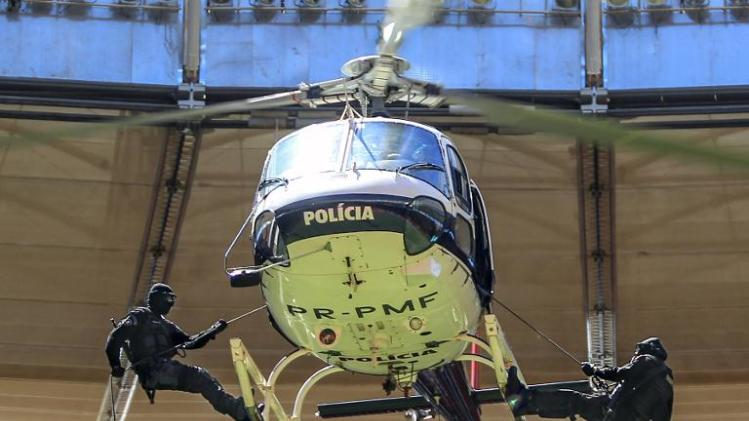




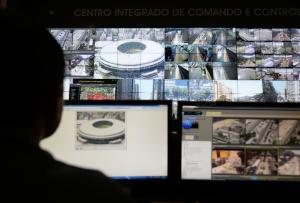
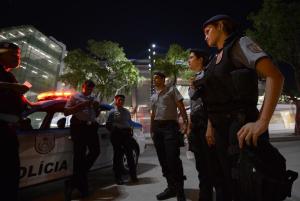

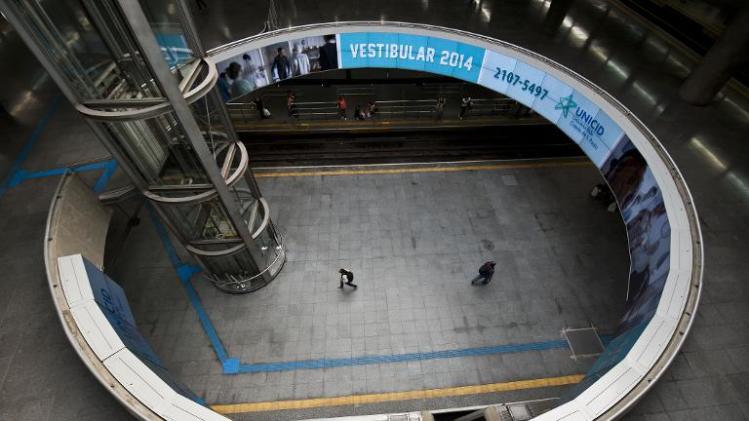



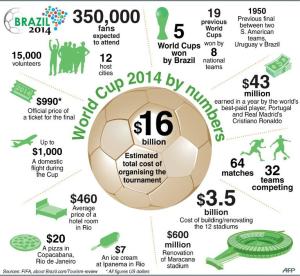
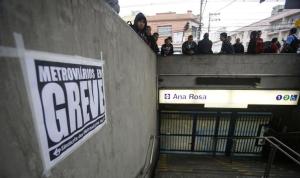






Good morning, A lot of good updates. I had missed Doug Noland this week, thanks for posting his piece, it was a good one. The big O may very well be crazy. Flt mh370 still missing, I think the families are on the right track with the reward.
ReplyDeleteHave a great day
Hi Fred, Kev , etc..
ReplyDeleteRussia's South Stream NG pipeline construction halted in Bulgaria over the weekend ,due to US sanctions. The meeting over the weekend in Bulgaria with US Senators,lead by McCain :
http://abcnews.go.com/Politics/wireStory/bulgaria-halts-work-south-stream-gas-pipeline-24048329
http://en.itar-tass.com/economy/735393
On the other end of the Black Sea, Georgia and the US military drills underway where construction of the NG pipeline from Baku to EU is scheduled:
http://en.trend.az/regions/scaucasus/georgia/2283011.html
NW
Morning Kev and NW ! The families definitely are on to something ! And I hope they get a generous donation from someone who could fund their whistleblower reward ! I think there are many psychopaths pulling the levers and pushing the buttons - O is probably one of them - but they are legion !
ReplyDeleteSouth Stream halted by Bulgaria after considerable EU and US pressure - no surprise there ! We shall see if the halt is temporary or permanent !
Weekend is over and rain has returned ! Enjoy your day !
China Navy to join in with US Navy and 20 other countries in world's largest naval drill near Guam. First time for China to join the party, the excersize called RIMPAC.:
ReplyDeletehttp://www.reuters.com/article/2014/06/09/us-china-usa-defence-idUSKBN0EK07820140609
MIC, wasting more oil. which could be used to grow food. Idiots.
One question - whom are they defending against ?
DeleteRandom kazooo playing marching bands?
ReplyDeletehttp://www.youtube.com/watch?v=F_2_wvac_88
Oh,,, the humanity !!
Solar flux/spots charts finally updated for May '14 ,both down: http://www.solarham.net/averages.htm
ReplyDelete